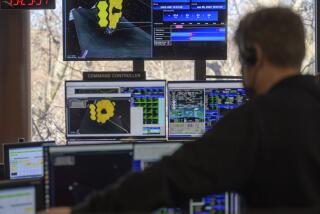Defense Award a Boost to TRW Facility
- Share via
TRW Inc. said Monday it will need to hire several hundred engineers for its space and electronics operations in Redondo Beach, where it will design and build components and electronics for the military’s next-generation communication satellites.
In a boost to Southern California’s aerospace industry, the Pentagon announced Friday it awarded TRW and Lockheed Martin Co. a $2.7-billion contract to start full-scale development of the so-called Advanced Extremely High Frequency satellite system.
About half of the award, or a little more than $1.3 billion, will be funneled to TRW’s Redondo Beach facility. There the company will develop the brains of the satellite, including the computer processors, antenna equipment and other electronics that will enable data to be transmitted 150 times faster than a current PC modem. The contract solidifies the region’s dominance in satellite research and development, analysts said.
The contract comes at a time when the industry has been battered by a downturn in the commercial aircraft business with a slowdown in air travel after the Sept. 11 terrorist attacks. The contract should help offset hundreds of expected layoffs in the commercial aerospace industry, analysts said.
“It’s a tremendous contract,” said Steve Tatum, spokesman for Lockheed Martin, which will develop the satellite bus and the ground control systems at its Sunnyvale, Calif., facility. “This is going to bring lots of advances to military communications.”
The system, with an initial constellation of two satellites that could grow to five, would give the U.S. military the same capabilities as a fiber-optic cable system, but in space and in a secure and jam-resistant environment, Pentagon officials said.
With the system, scheduled to be deployed in 2006, troops on the ground would be able to instantly transmit video images and digital maps of the battlefield to command centers anywhere in the world.
The contract was awarded after Boeing Co., the world’s largest satellite maker, dropped out of the program, saying its role had been diminished significantly.
Lockheed, TRW and Boeing were supposed to build the system together, but Boeing decided last week that the company was not willing to take the risk given the lowered reward it would get. Boeing’s satellite systems unit in El Segundo would have built the antennas and the secure digital links, but its share of the contract had shrunk by more than half from about $900 million to $400 million.
“Over the last several months, the Boeing share of the program has continued to shrink, while the technical and financial risks we were being asked to take on this challenging program were disproportionate to our role,” the company said.
The AEHF satellites are slated to replace the troubled Military Strategic and Tactical Relay or Milstar system of satellites that have not performed as well as promised.
The contract was the second piece of good news for Cleveland-based TRW in as many weeks. The company recently said it expects to reap $4 billion to $5 billion in revenue supplying components for the Joint Strike Fighter after its team won the Pentagon contract.
More to Read
Inside the business of entertainment
The Wide Shot brings you news, analysis and insights on everything from streaming wars to production — and what it all means for the future.
You may occasionally receive promotional content from the Los Angeles Times.










